WHAT ARE CORE BELIEFS?
Do
you exercise?† If you do, you know how
much focus is put on developing your physical core.† Having a strong, flexible core prevents
injuries.† Your core is right in the
middle of your body.† It encompasses all
the muscles in the front, back, and sides of your midsection.† When you do exercises that strengthen your
core muscles, you stabilize your whole body.†
Your posture is good.† You have
strength to run and walk.† When you donít
exercise your core muscles and they are weak, you could have back pain or a
protruding waistline.

Your
core beliefs also provide a strong structure.†
Core beliefs are how you see yourself, other people, the world, and the
future. Once you identify your core beliefs, you can prevent injuries, such as
emotional pain, bad decisions, and not living up to your potential.† Like your physical core, your core beliefs
need to be strong and flexible. When subconscious, negative core beliefs guide
your life, your overall sense of well-being is weak.† This can cause unnecessary, emotional and
social harm.† You may live a
dysfunctional life that prevents you from doing small, ordinary things.†

How
Core Beliefs Develop
As
you were growing up, things happened to you, and you interacted with people in
each of those situations.† Based on your
experiences, you formed impressions about yourself and others.† These impressions are your core beliefs.† Your childhood, your basic temperament, and
your environment combine to form them.† Your
core beliefs affect the way you live your life and determine the following:† what you believe about yourself, what you
believe about others, and what you believe about the world.
∑
What You Believe About Yourself:† As you grew up, you learned a great deal
about yourself from the things that your parents, brothers, sisters, teachers,
and friends said to you.† As you
interacted with them, you started to decide who you were.† What you thought about yourself then fashioned
what you did and how you did it.
∑
What You Believe About Others:† As you grew, you learned many things about
other people based on your interactions with them and on your observations of
their behavior.† Are they good?† Do they help one another?† Do they hurt people?† Are they mean?† If you grew up in a loving home, you might
have learned that it is safe to trust people, to take risks, and to help
others.† If you did not grow up in a
loving home, you might have learned that it is not safe to trust people or that
other people may hurt you and abuse you.
∑
What You Believe About the World:† What you believe about yourself and about
others affects how you see the world.† If
you come from a caring background, you may believe that the world is a safe
place. †The future is filled with hope,
and there is a chance for peace.† If you
come from a harsh background and live under constant stress, you may believe
that the world is frightening and that you are powerless to bring about
change.†
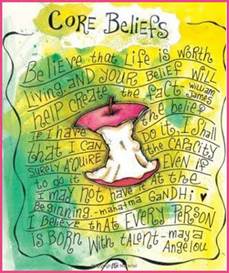
Why
You Need to Challenge Your Negative Beliefs
If
you believe something is true, you try to support it.† Every time you confirm what you think is
true, the belief gets a little stronger.†
Eventually, what you believe affects your behavior.
Letís
say you believe the following statement:†
I am not smart.† You take a test
at school.† You fail.† For you, this confirms that you are not
smart.† You begin to have test anxiety
and stop doing your homework.† You no
longer ask questions in class because others will also then know that you are
not smart.† The reality is that you did
not study for the first test.† You
stopped trying.† You stopped asking
questions.† It did not have anything to
do with being smart or not being smart.
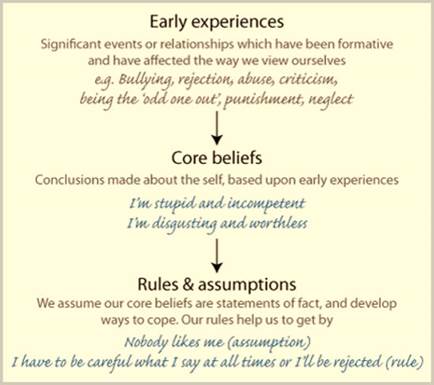
We
all have negative core beliefs.† By identifying
and challenging them, you can focus on what is really true.† This is a much better way to use your mental
energy and time.† Life is more successful
when you are guided by your positive core beliefs rather than your negative
core beliefs.
Negative
Core Beliefs
Identify
the thoughts, conscious or subconscious, that guide your thinking when you are
making decisions.† How do you believe
that you developed these guiding principles?†
Are they characteristic of your personality?† Are they from childhood experiences?† Are they from the environment in which you
lived?† Why do you think you tell
yourself these things?† There are four
negative core beliefs that are common but not helpful or healthy viewpoints to
rely on when you work through the decision-making process.††††
Negative:† I am defective.
In
the back of your mind, you may consider yourself flawed, incompetent, or
inferior.† This makes it difficult to
have close relationships because you fear the other person will one day
discover that you are defective.† Have
any of these statements ever come to mind?
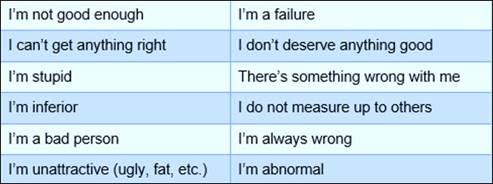
Negative:† I am unlovable.† I will be abandoned.
You
tell yourself that you do not know if you belong.† You wonder if you deserve love or if you can
be loved.† You feel lonely even when you
are with people.† You choose not to form
close relationships because you think, in the end, you will be rejected.† This enables you to avoid the pain.† You may choose not to voice your own opinion
for fear that someone will walk away from you if you do.† If this is one of your core beliefs, one or
more of these statements may have crossed your mind:

Negative:† I am helpless.† I am powerless.
If
this is your core belief, you do not think you have control over
situations.† You are not confident that
you can handle things well or by yourself. You may†† micromanage or try to over control certain
circumstances.† Sometimes, you may give
up entirely.† These are statements that
you may say to yourself if this is one of your core beliefs:

Negative:† I have to fix this.† I am responsible (for you).
You
give up taking care of yourself to take care of others.† You feel guilty when you donít.† You think you are responsible for other
peopleís happiness.† You apologize too
much.† This core belief may have resulted
because, as a young person, you are or have been responsible for other family
members.
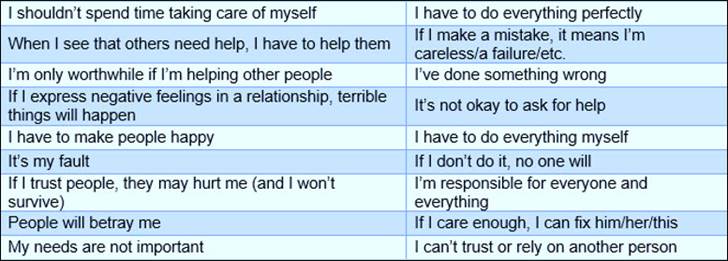
Wow!† Thatís a little depressing.† Who wants to have those thoughts running
through their head?† There is good news.
Just because you think these negative things now or just because you have
thought some of them for a very long time does not mean that you cannot change
them.† Change is never easy.† You have to be very aware of what your mind
is telling you when you make decisions.†
It takes time and practice.†
However, uncovering these negative beliefs that have caused you to make
unsound or unhealthy decisions in the past is the best first step.† Once you do that, you are on your way to
better decision-making!
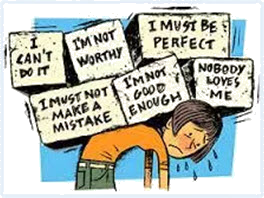
Challenging
Your Negative Core Beliefs
Look
at this chart.† It is one way to
challenge a negative belief when it comes to mind.† Using the voice of truth means writing down
the facts - no emotions, no feelings, no opinions, and no assumptions Ė the
facts.† Do this just like you would if
you were involved in a court case.† List
what is observable and describable.†
Stating the obvious can help you see things that may not be true and may
need to be changed.
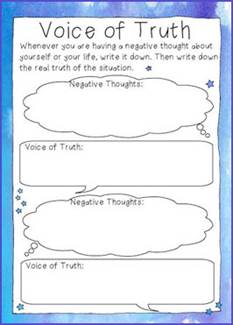
Positive
Core Beliefs
Hereís
the good part.† When you remember the
times that you have been successful, have worked hard, or have had good
relationships, you are telling yourself that you are worth it.† When you know that you are worth it, you have
hope.† This encourages you to keep
trying.† The more you try and succeed,
the easier it is to remove those negative statements from your mind.††††
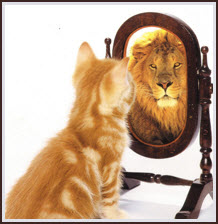
People,
for one reason or another, sometimes tell us things that are hurtful or treat
us in a harmful way.† When this happens,
the negative core beliefs creep in again.†
Consciously choosing your core beliefs, instead of listening to what
others say to you, can make your life an amazing adventure.††† These are your core beliefs.† They become your rules for living.† They tell you what you can do and what you
cannot do.† They are the self-talk in
your head.† Talk to yourself well.† Choose your core beliefs carefully, and make
them stick!
EXAMPLES
OF POSITIVE CORE BELIEFS
Positive:† My life is an incredible gift.
You
count your blessings.† You choose to
learn and grow, even in difficult circumstances.† You persevere.† You believe that you can.
Positive:† Today is the most important day of all.
You
live in the present.† You learn from the
past and do not dread the future.† You
are mindful and aware of all that is around you.† This allows you to live fully.† You††
give the most of yourself to the people around you and enjoy what you
do.
Positive:† Everything will be all right.
No
matter how bad things are now, they will pass.†
You can learn and grow through hard times.† Opportunities are present in the worst of
circumstances.
Positive:† I am free to be ME.
You
choose to stop comparing yourself to others.†
You stop living for other people and their opinions.† You take steps to identify who you are and
choose to be true to yourself.
Positive:† The work is worth it.
Life
is not easy.† There are no
shortcuts.† Be patient.† There is value in the hard work and the time
it takes to achieve your goals.
Positive:† Being wrong is okay.†
Sometimes
failing is what reveals the way to the right place.† Do not be afraid of being wrong or
failing.† You learn valuable lessons
about yourself and others when things donít work out and you have to
re-evaluate what you need to be doing.
Focus
on developing your core beliefs.† This
will keep you strong and flexible.† You
will live up to your potential.† Most
importantly, you will be glad you are YOU!
Print
the worksheet by clicking on the graphic below.†
As you complete it, take some time to think about the core beliefs that
influence your decisions.

Below are additional educational resources and activities for this unit.
